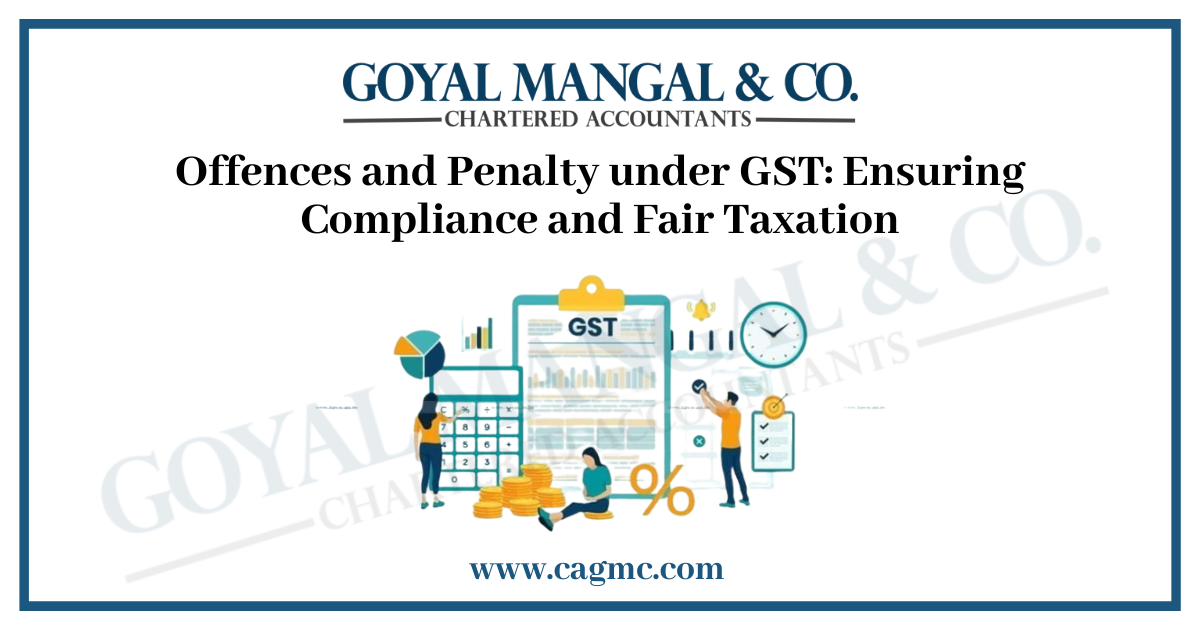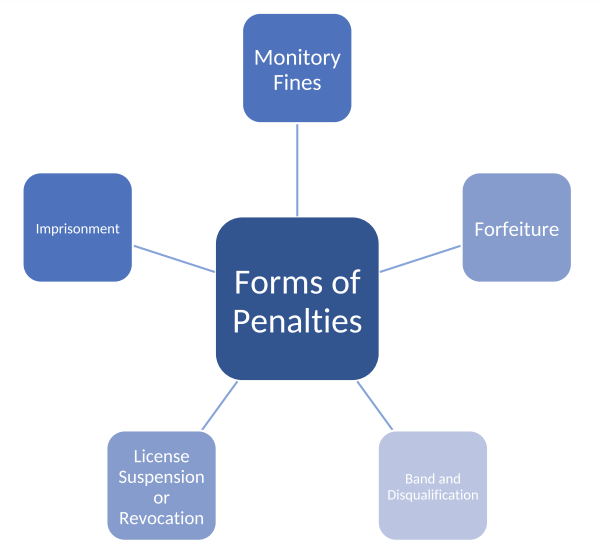
The Goods and Services Tax (GST) has changed the system of indirect tax in India since its implementation. The GST has brought together several central and state taxes into a single uniform tax framework. While the GST structure promotes businesses and decreases tax cascading. It also set up strict regulations to make sure about tax compliance. In this article, we will provide the various offences and penalties under GST set by the government.
| Table of Content |
What is the meaning of Offences?
In a legal context, offences refer to actions or conduct that are considered violations of the law or rules established by a governing authority. Offences can be committed by individuals, groups, or organizations, and they are subject to legal penalties or consequences.
Offences can be classified into various categories based on the severity and nature of the violation. Common categories of offences include:

- Criminal Offences: These are serious violations of the law that are considered crimes.
- Civil Offences: Also known as civil wrongs or civil infractions, these offences are usually non-criminal violations that cause harm to another individual or entity.
- Regulatory Offences: These offences involve violations of regulations or rules set by government agencies or regulatory bodies. For example, tax evasion, etc.
- Traffic Offences: These offences involve violations of traffic laws, such as speeding, running a red light, or driving under the influence of alcohol.
- Administrative Offences: These offences relate to violations of administrative rules or policies within organizations or institutions.
Offences under GST
Offences are outlined in the GST Act and Rules and can attract penalties and other legal consequences. There are various offences and penalties under GST. Some of the common offences under GST include:
- Tax Evasion: Wilfully evading GST by not registering under GST, not filing GST returns, or underreporting taxable transactions.
- Fake invoicing under GST: Supplying goods or services without issuing proper tax invoices or issuing fake invoicing under GST or incorrect invoices to claim fraudulent input tax credit (ITC).
- Availing False Input Tax Credit: Claiming ITC based on fake or invalid invoices, or claiming ITC on goods or services that are not used for business purposes.
- Failure to Register under GST: Failing to register under GST despite crossing the registration threshold, or conducting taxable supplies without obtaining GST registration.
- Non-Payment of GST: Collecting GST from customers but not remitting it to the government within the stipulated time frame.
- Late Filing of GST Returns: Failing to file GST returns within the prescribed due dates.
- Failure to Maintain Records: Not maintaining proper books of accounts, records, and documents as required under GST law.
- Obstructing Tax Authorities: Obstructing or impeding tax officials during their duty.
- Supplying Goods or Services Without Proper Invoice: Making supplies without issuing a proper tax invoice or using incorrect invoice formats.
- Transporting Goods Without Proper Documentation: Transporting taxable goods without the required documents like an e-way bill, where applicable.
- Misrepresentation of Information: Providing false or misleading information during the GST registration process or while filing returns.
- Fraudulent Refund Claims: Making fraudulent claims for GST refunds.
What is the meaning of Penalty?
The term “penalty” refers to a punishment or consequence imposed on someone who has committed an offence, violation, or wrongdoing. Penalties are established by laws, rules, regulations, or governing authorities as a deterrent to discourage individuals or entities from engaging in undesirable behaviour or actions that could harm others or society as a whole.
In various contexts, penalties can take different forms, including:

Penalties under GST
Penalties are meant to deter non-compliance and ensure that taxpayers fulfil their tax obligations properly. Here are some common penalties under GST:
- Late Filing of GST Returns: If a taxpayer fails to file their GST returns within the prescribed due dates, they are liable to pay a late fee. The late fee is Rs. 100 per day per return (Rs. 50 for CGST and Rs. 50 for SGST) up to a maximum of Rs. 5,000. No late fee is charged for IGST.
- Incorrect GST Return Filing: If a taxpayer provides incorrect information in their GST return, they may be liable to pay a penalty of 10% of the tax amount due, subject to a minimum of Rs. 10,000.
- Tax Evasion or Fraud: In cases of tax evasion or fraudulent practices, the penalty can be up to 100% of the tax amount evaded or wrongly claimed.
- Failure to Issue Proper Invoices: If a registered person does not issue proper tax invoices or documents for the supply of goods or services, the penalty can be up to Rs. 25,000.
- Availing False Input Tax Credit (ITC): If a taxpayer claims ITC based on fake or invalid invoices or claims ITC without a proper legal entitlement, the penalty can be up to 100% of the wrongly claimed or availed credit.
- Failure to Register under GST: If a person is required to register under GST but fails to do so, they may be liable to pay a penalty up to an amount equivalent to the tax evaded.
- Failure to Maintain Proper Records: Failure to maintain the required records and documents as per GST laws can lead to a penalty of up to Rs. 25,000.
- Obstructing Tax Authorities: Obstructing or preventing tax officials from performing their duties can lead to penalties.
- Transporting Goods Without Proper Documentation: Transporting taxable goods without the required documents, such as an e-way bill, can attract penalties.
- Fraudulent Refund Claims: Making fraudulent claims for GST refunds can lead to penalties.
In situations where there is no penalty, however, interest may apply
Under the GST regime in India, there are certain situations where interest may apply for delayed payment or filing, but no penalty is levied. These situations are outlined in the GST Act and Rules. Here are some instances where interest may apply, but no penalty is imposed:
- Delay in payment of invoice: As per the provisions of section 16(2) of the Central Goods and Services Tax (CGST) Act, 2017. If the supplier does not pay the tax collected from the receipt to the government within six months from the date of invoice, then there will be reversed ITC and no such penalty charge.
- The incorrect type of GST charged: There is no penalty, but have to pay the correct GST and get refunded for the wrong GST paid previously.
- Wrongfully charging GST rate: Interest of @18% applicable
- Incorrect GST Return Filing: Interest of @18% on shortfall amount
Conclusion
Understanding the various offences and penalty provisions under GST is crucial for all taxpayers to maintain compliance and integrity in their tax practices. As we have explored in this article, offences and penalties under GST range from late filing of returns to more serious issues such as tax evasion and fraudulent practices. The penalties for these offences can be substantial, imposing financial burdens and legal consequences on those found guilty. To avoid falling into the trap of non-compliance, businesses and individuals must prioritize due diligence, keep accurate records, and file returns promptly.


